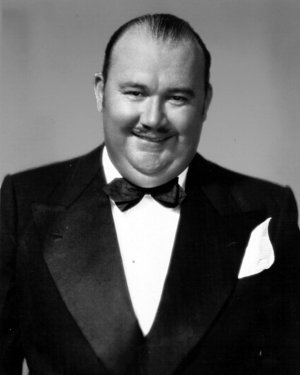Paul Whiteman

-
Birth Name
Paul Samuel Whiteman -
Born
March 28, 1890
Denver, Colorado -
Died
December 29, 1967 (age 77)
Doylestown, Pennsylvania -
Featured Vocal Groups
Modernaires
Though called the “King of Jazz,” Paul Whiteman rarely ventured into true jazz territory. Whiteman’s greatest legacy to jazz lies in his eye for talent. Whiteman alumni include such luminaries as Jimmy Dorsey, Tommy Dorsey, Jack Teagarden, Charlie Teagarden, Bix Beiderbecke, Bunny Berigan, Bing Crosby, Red Norvo, Mildred Bailey, and Johnny Mercer. Whiteman was one of the most important figures in twentieth century American pop music. Formed at a time when the country’s musical landscape was changing, Whiteman’s orchestra broke much new ground. His was the first orchestra to popularize arrangements, the first to use full reed and brass sections, the first to play in vaudeville, the first to travel to Europe, the first to use a female singer, and the first to use a vocal group.
Born in Denver to a musical family, Whiteman learned violin and viola as a boy, eventually landing a spot in the Denver Symphony Orchestra. He later traveled to San Francisco, where he was a member of several classical ensembles. It was in San Francisco that he became interested in the popular music of the day and decided to pursue it as a career. He was sidetracked by World War I, however, during which he trained musicians in the Naval Training Camp Symphony. After the war, he returned to San Francisco and formed a dance band, later moving to Southern California before heading to the East Coast. The group made their first recording for Victor in August of 1920 and went on to become the most successful recording artist of the 1920s.
Whiteman’s most famous vocalists were Bing Crosby and Mildred Bailey, who sang in the early 1930s. In 1933, famed jazz trombonist Jack Teagarden joined Whiteman. Though Whiteman’s band was the most popular white orchestra in the nation at the time, Teagarden’s trombone magic was lost in Whiteman’s musical style, and his career suffered. Unfortunately, he was locked into a contract that gave him no avenue of escape. When swing broke out in 1935, Teagarden was forced to watch from the sidelines, and when a group of disgruntled Pollack musicians formed their own band that year he had to turn down their offer of leadership. Bob Crosby ended up with the job instead. It was 1939 before Teagarden was able to break free from Whiteman.
As the late 1930s came around, Whiteman’s music sounded old-fashioned. In 1938, Whiteman tried to revamp his style, hiring new arrangers and bringing in the Modernaires. The vocal group appeared on the band’s radio show as well as touring and recording with the orchestra. While with Whiteman, the Modernaires also continued to perform on their own. Aside from the Modernaires, vocalists during this period included Joan Edwards and Clarke Dennis, who joined the band in late 1938. Bob Hannon sang in late 1939. The Modernaires left Whiteman in April 1940 over monetary issues after the bandleader lost his radio sponsor and had to cut salaries. Whiteman disbanded soon after and started a new orchestra only to disband it shortly thereafter to star in the film Strike Up the Band.
Whiteman formed another group at the end of 1941, finally achieving the modern sound for which he was looking. In 1942, he signed with the newly-formed Capitol Records, co-founded by Whiteman alum Johnny Mercer. In early 1942, vocalists were Frank Howard, Dolly Mitchell, and Johnny Novak. Larry Neil sang in late 1942. Capitol vocal group the Mellowaires, who backed many of the labels stars, and Martha Tilton, another Capitol artist, also sang on Whiteman recordings. Mercer, Teagarden, Billie Holiday, and Wingy Manone recorded with Whiteman that year as well. The draft eventually took its toll on Whiteman’s line-up, and he disbanded.
In 1944, Whiteman organized and toured with a new nostalgic orchestra. After the war, he settled down at ABC, conducting studio orchestras for radio and television and occasionally making recordings. He used several singers on an as-needed basis, though he favored Eugenie Baird. In the mid-1950s he hosted his own television show. Paul Whiteman died in 1967 at age 77.
Sources
- Simon, George T. The Big Bands. 4th ed. New York: Schirmer, 1981.
- Advertisement. Billboard 30 Apr. 1938: 10.
- “Duce and Hitler Toasts on Air.” Spokane Daily Chronicle [Spokane, Washington] 6 May 1938: 11.
- Whiteman, Paul. “Going Great Guns!” Billboard 27 Aug. 1938: 14.
- “Band Leader Experiments With Music.” Ottawa Citizen [Ottawa, Canada] 1 Oct. 1938: 28.
- “Vaudeville Reviews: Loew's State, New York.” Billboard 7 Jan. 1939: 22.
- “Whiteman, Waring Bands to Be Heard for Chesterfield.” The Victoria Advocate [Victoria, Texas] 7 Sep. 1939: 2.
- “The Reviewing Stand: Paul Whiteman.” Billboard 28 Oct. 1939: 12.
- “Routes.” Billboard 11 Nov. 1939: 56.
- Radio Schedule. The Pittsburgh Press 28 Nov. 1939: 22.
- “Routes.” Billboard 9 Dec. 1939: 56.
- “Modernaires Leave Paul Whiteman.” Down Beat 15 Apr. 1940: 1.
- “On the Air: Paul Whiteman.” Billboard 14 Feb. 1942: 22.